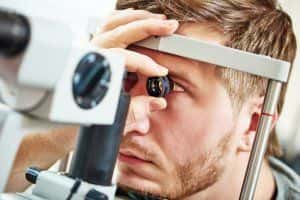Vision therapy is a doctor-supervised program that helps people of all ages improve their visual-motor skills. Therapy helps your eyes and brain work together better, even if you have perfect vision. For years, people believed that some types of eye conditions, such as lazy eye or crossed eyes, could
Read more
Glaucoma is an eye condition that is often characterized by an abnormally high intraocular pressure (i.e., pressure in the eye), which can ultimately damage the optic nerve. The added intraocular pressure is the result of fluid accumulation in the eye. If left untreated, it can result in complete vision loss.
Glaucoma may not produce any noticeable changes in your vision until the disease is more advanced. That’s why having regular eye exams starting at age 40 — or earlier for certain ethnic groups — is an important part of preventing loss of vision from glaucoma.
Currently, there is no cure for glaucoma. In addition, any damage to the optic nerve cannot be reversed. Once glaucoma has been diagnosed, though, several treatments including medicated eye drops and surgery are available. Treatments may slow the damage and prevent further loss of vision.
The surgical procedures performed to treat glaucoma include:
- Laser surgery (laser trabeculoplasty). This approach is performed to open drainage canals in the eye that are clogged.
- Filtering surgery (trabeculectomy). With this surgical technique, a small piece of tissue is removed to allow fluid to drain properly from the eye.
- Placement of a drainage implant, such as iStent. With this treatment option, your ophthalmologist inserts a small tube into the eye that allows excess fluid to drain.
If you notice any changes in your vision, contact us for an appointment, so we can diagnose your vision problem and provide suitable treatment options. If your vision suddenly becomes blurry and is accompanied by severe eye pain, nausea, headache, reddening of the eye or halos, contact your eye doctor or go to the emergency room immediately, as this may be a sign of vision-threatening acute angle-closer glaucoma.
-
Vision Therapy: Not Just For ChildrenCategory: Newsletters, Tips for Healthy Eyes
-
Tips to Alleviate Dry EyesCategory: Newsletters, Tips for Healthy Eyes
Studies show that dry eyes are one of the most common eye problems throughout the United States. Dry eyes are caused by a lack of quality tear production, and are most common in both men and women over the age of 50. Tear production can be limited by a variety of causes; one of the most common is a specific
Read more -
Stop Rubbing Your EyesCategory: Newsletters, Tips for Healthy Eyes
It feels like a natural thing to rub your eyes when they are itchy, watery, or otherwise irritated. Keeping your hands away from your eyes, however, is a smart choice for promoting better eye health. Rubbing your eyes can lead to everything from eye injuries to damaged vision. Rubbing your eyes offers
Read more -
Nutrition and Your EyesCategory: Newsletters, Tips for Healthy Eyes
As you’ve probably heard, carrots are good for your eyes. Technically, they can’t give you superhero-quality eyesight like you may have been told when you were young, but they do contain ingredients that are instrumental in protecting your vision and overall health. Carrots are rich in beta-carotene
Read more -
How Did I Get a Stye?Category: Newsletters, Tips for Healthy Eyes
A stye, medically known as a hordeolum, appears in the eyelid area as a red pimple-like bump, and is usually tender or painful. Styes typically occur near the lash line (external hordeolum), but can also appear on the underside of the eyelid (internal hordeolum). In addition to the telltale lump, a stye
Read more -
How Can You Prevent an Eye Infection?Category: Newsletters, Tips for Healthy Eyes
Do your eyes feel swollen, itchy or watery? If so, you might want to book an appointment with your eye doctor to have your eyes examined. Although many people automatically attribute their discomfort to allergies, it’s important to leave the diagnosis to a trained professional that is knowledgeable
Read more -
What the Eyes Tell Us About Overall HealthCategory: Newsletters, Amazing, Interesting Eyes
Eyes are your window to the world. Everything you experience is enhanced by what you see. By the same token, eyes can be a window into your body. When it comes to your overall health, your eyes act like an open book shedding light on your condition. A thorough eye exam with your ophthalmologist or optometrist
Read more -
Vision Charities to Help You Give Back This Holiday SeasonCategory: Newsletters, Amazing, Interesting Eyes
Imagine trying to succeed at work at school if you could not see clearly. Unfortunately, that's the reality for far too many people in the world. Whether they cannot afford eye care, are blind or have a vision disability, poor eyesight makes life much more difficult. You can make a difference this holiday
Read more -
Eyeball Licking: A Dangerous New Trend?Category: Newsletters, Amazing, Interesting Eyes
In the summer of 2013, news spread quickly about a dangerous new trend, called "worming" or oculolinctus, and a serious outbreak of disease among Japanese youth. Upon further investigation, many news sources retracted or amended previously published stories, saying the stories of a sudden increase in
Read more -
Teaching Kids About Pink EyeCategory: Newsletters, Kid's Vision
Conjunctivitis is by no means limited only to children. An infection or inflammation of the conjunctiva -- the membrane within the eyelid and protecting the white aspect of our eyes -- can occur in individuals of any age secondary to an infection, an allergic reaction or chemical irritation. Infectious
Read more -
How Vision Problems Affect LearningCategory: Newsletters, Kid's Vision
Reading is an instrumental part of your child’s ability to learn. In order to write complete sentences or do mathematical problems, a child must first be able to understand what is on the page in front of them. If your child is suffering from vision problems, it may be drastically interfering with
Read more -
Getting Kids to Wear GlassesCategory: Newsletters, Kid's Vision
In most of North America, optometrists are known as Doctors of Optometry (D.O.). As physicians, they are able to diagnose eye disease and prescribe medications or corrective lenses. Licensure as a DO requires a Bachelor's Degree and successful completion of a four-year school of optometrics. Educational
Read more -
Allergy Management and Your EyesCategory: Newsletters, Tips for Healthy Eyes
For those who suffer from allergies, exposure to pets, pollen, or dust mites can quickly lead to red, itchy, watery eyes. Although seasonal allergies are notorious for causing eye symptoms, year-round exposure to allergens can be just as problematic. If you develop itchy, red, irritated, puffy, or watery
Read more -
5 Things You Can Do to Protect Your Eye HealthCategory: Newsletters, Tips for Healthy Eyes
Protecting your eyesight is an important part of maintaining your quality of life. Here are five simple things you can do to help preserve your vision. 1. Stop Smoking It is no secret that smoking is strongly linked to many health problems; however, did you know that it can also damage your eyes and
Read more -
Blue Light Exposure: What Is It?Category: Newsletters, Conditions That Affect Vision
Is blue light hurting your vision? Find out how the light can affect you.
Read more -
Is Office Lighting Affecting Your Vision?Category: Newsletters, Tips for Healthy Eyes
Do your eyes hurt, burn or itch after a day at work? Poor lighting may be to blame for your symptoms. Many companies use inexpensive fluorescent lighting to light large areas because it's a fairly inexpensive option. Unfortunately, your eyes pay the price. What Kinds of Eye Problems Can Fluorescent
Read more

